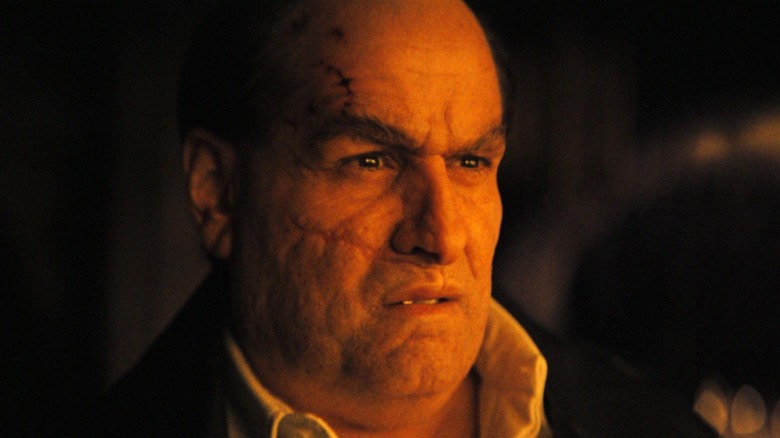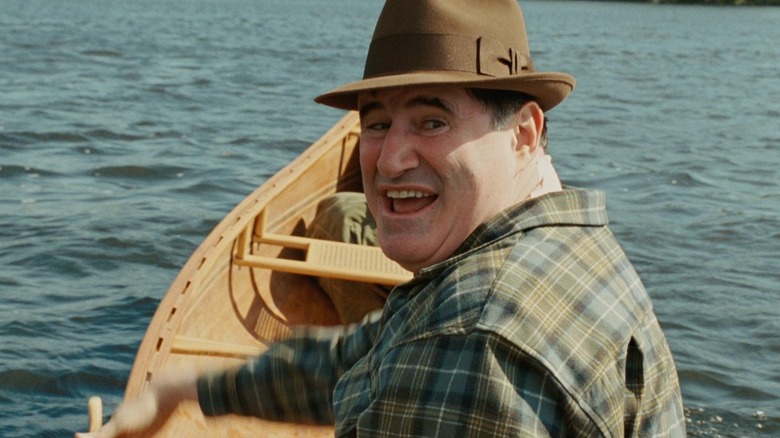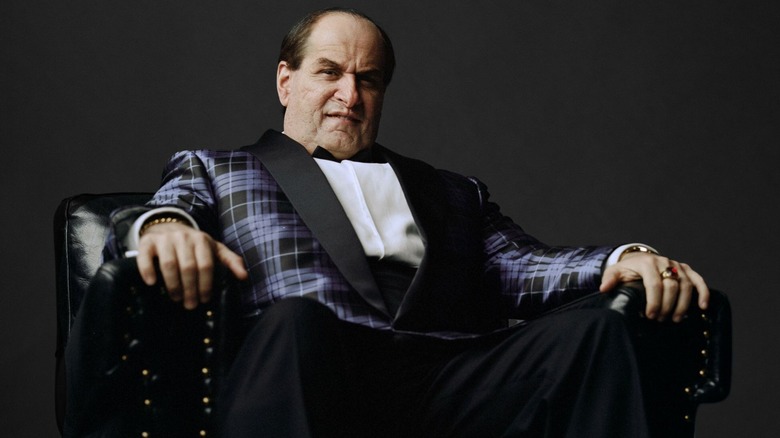
A lot of publicity surrounding the release of "The Batman," which just hit HBO Max, has focused on the "unrecognizable" performance of Colin Farrell as the Penguin. It's undeniable that the actor, a notoriously handsome and charming gentleman who has topped many a Sexiest Man Alive list, looks nothing like himself in character as Oswald Cobblepot. He's balding, scarred, has a large nose, and crooked teeth. To portray the Penguin, Farrell wore prosthetics and a fat suit, which took between two and four hours to apply each morning. The entire make-up process is admittedly excellent and does exactly what it sets out to do in making Colin Farrell look nothing like Colin Farrell. The performance itself is good, as one would expect from an actor this consistently interesting, and plenty of people may not even realize who's playing the Penguin until the credits roll. For me, however, every time he appeared on-screen, I couldn't help but think about how distracting this "transformation" was, mostly because he looked so much like Richard Kind.
No, seriously, why isn't beloved character actor Richard Kind playing the Penguin? What was stopping director Matt Reeves from hiring the perennial supporting man of stage and screens big and small, an always-welcome part of comedy, drama, and everything in-between? He's got such a naturally malleable presence that can veer between threatening and pathetic, psychotic petulance, that is practically the blood force of the Penguin. I'm clearly not the only person who made this connection. When the first trailer for "The Batman" dropped, Twitter was agog at the Penguin lookalike situation, which led a lot of people to consider how perfect he could have been in the role. Just imagine it.
Hell, if we're on the topic of character actors who Farrell looks eerily alike in "The Batman" who also would have been great for the role of the Penguin, what's Paul Giamatti up to these days? Is he also secretly annoyed that he didn't get to play Jared Leto's role in "House of Gucci"? Or John Carroll Lynch, one of film and TV's most kaleidoscopic performers of total creeps? All of these options make so much sense, or hell, so would just letting Farrell be Farrell. He's shown himself to be excellent at playing schlubby outcasts (see "The Lobster") as well as charismatic sociopaths ("Fright Night.") But instead, we have yet another instance of heavy make-up and padding taking over a performance to levels of undeniable distraction.
We Expect Actors To Transform Themselves To Some Degree

We expect actors to transform themselves to some degree. It's part of the job, to change yourself into the character and rid yourself of any elements that may detract from the performance. Some of the best and most beloved examples of on-screen acting utilize some form of prosthetics, from Marlon Brando in "The Godfather" to John Hurt in "The Elephant Man." Like any part of the job, these tools of transformation are just that: tools one can use to do the job. The issue changes when said tools become a crutch, and when what should be a mundane part of the work is fetishized into something far less savory.
There's a long history of actors using fat suits and "going ugly" for the purposes of prestige. It's practically a guaranteed route to an Oscar these days. Consider all of the hubbub that surrounded Gary Oldman slathering himself in latex and a fatsuit to play Winston Churchill in "Darkest Hour," the movie that won him that long-awaited Best Actor Award. Or the recent coverage surrounding Renee Zellweger in her newest role on NBC's "The Truth About Pam," wherein the fatsuit and decision to "drab down" have hogged up more of the discourse than her actual performance.
It's not just the exhaustive, often hours-long performance of getting unattractive that the industry loves to elevate to the levels of genius that nags at us: it's the way that it's endlessly contrasted with the before state, as if a stunningly hot person being less beautiful for a few weeks of shooting is something brave. When Vogue wrote about Margot Robbie playing Tonya Harding in "I, Tonya," the film's make-up artist lamented that their "biggest obstacle" to turning her into the disgraced figure skater "was how classically beautiful Margot was." You'd think that she was playing the Phantom of the Opera, not a regular-looking woman. Even Farrell has talked about how "liberated" he was by the disguise of the Penguin. Would that we were all so dazzlingly handsome to have to worry about such problems.
There's A True Thrill In Seeing Great Make-Up At Work In A Film, But...

This process also highlights another disheartening truth about the "hot to ugly" focus of the industry: the opportunities for those who do not fit the bill of conventional attractiveness — white, cisgender, skinny, able-bodied, devoid of quirks or unruly qualities — are scant, and when they appear, those who fit the bill are still not considered. These roles become moments for transformation, for "bravery," and for a kind of distracting showboating wherein one's willingness to not be hot or skinny for a while becomes the primary focus. It turns having those kinds of bodies into a leering sideshow, and frankly, society does that enough as it is.
There's a true thrill in seeing great make-up at work in a film, but something still seems to have gotten bogged down in this approach. It's only further limited the industry's gaze. What one would have been an ideal role for a meaty character actor to sink their teeth into is now just another chance to make a hot person less than hot. It feels like we don't trust audiences, actors, or the roles enough nowadays. It's not that one should have to look or sound exactly like the character to play them – that's just boring and misses the point of acting – but it does feel like this adherence to a particular kind of physical transformation (and to those who we allow to do them) is more limiting than freeing. If fat bodies and the less-than-attractive facades that make humanity so much more interesting could be seen as more than comedic best friends or victims of pity, then maybe storytelling as a whole can improve.
None of this is to knock Farrell, who, again, is clearly having fun in the role and doing a good job. You can't blame an actor of his caliber for wanting to take on a role this interesting, one where he's allowed to be menacing, weird, petty, and snivelling. He's essentially the smarmy middle management of Gotham's underworld. It's one hell of a role, so of course I can't help but think about those actors that would have killed it and probably weren't even considered for it. Such is the unfortunate cycle of Hollywood, but isn't it about time we made a few changes to it? So, let's give it up for the Richard Kinds, the Alfred Molinas, the Wendell Pierces, the Benedict Wongs, and all the character actors who don't need latex masks to get the job done. Just give them the jobs and see how it goes.
Read this next: Batman Movies Ranked From Worst To Best
The post No Seriously, Why Isn't the Penguin Being Played by Richard Kind? appeared first on /Film.
0 Commentaires